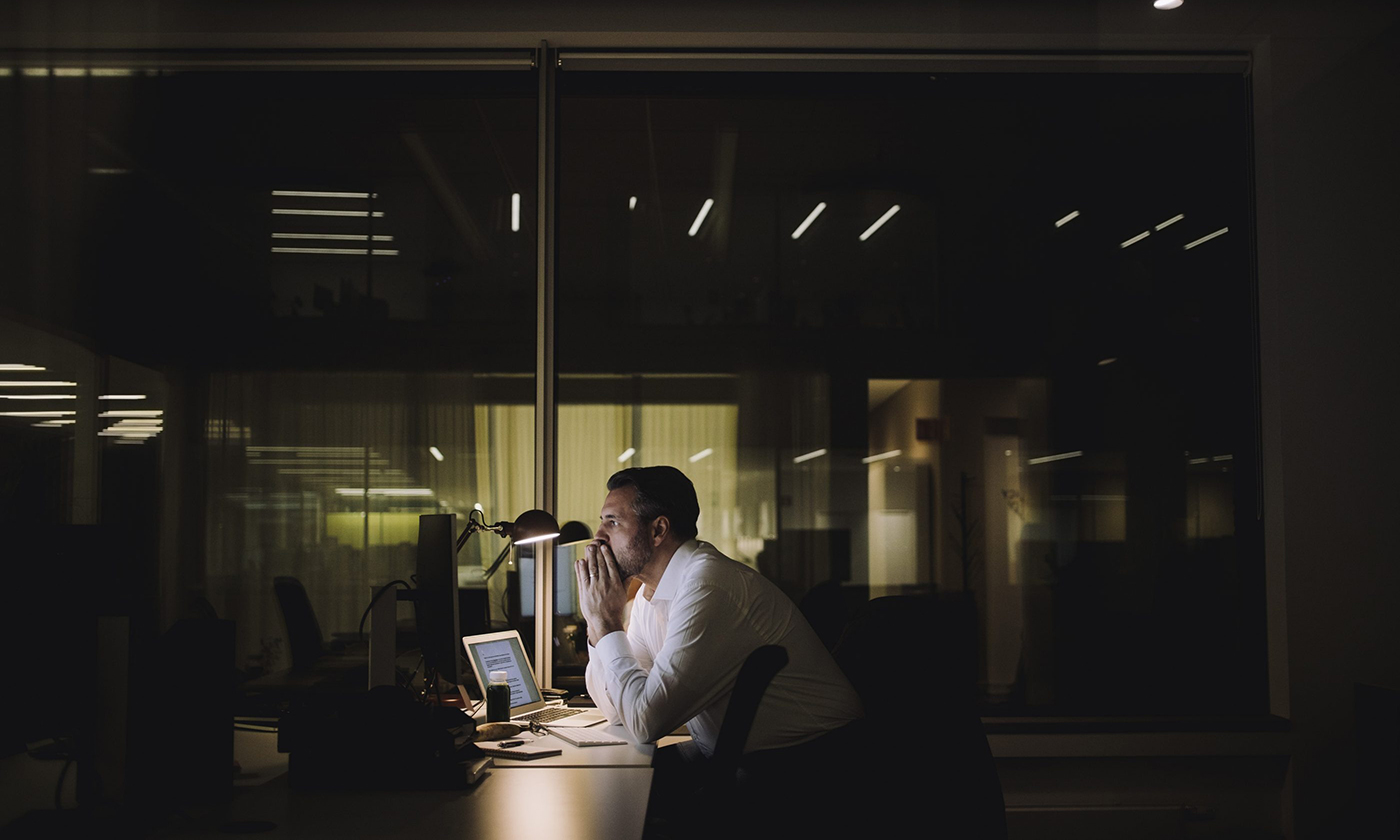
加班在美国的文化中已经根深蒂固,人们一直用加班来表现对工作的重视程度、争取发展机会或者取悦严厉的老板。成为工作狂,被描述成一种备受领导者称赞的高尚的职业道德,这可能是美国人清教徒祖先遗留下来的一种理念。
以埃隆·马斯克为例。马斯克号称曾在特斯拉(Tesla)工厂里过夜。他后来在Twitter鼓励员工效仿他的做法,命令员工“高强度长时间工作”。高盛(Goldman Sachs)曾因为高强度的100小时工作周政策遭到抨击,之后,高盛CEO苏德巍允许员工在周六休息,但他表示,“多付出一些努力”能够带来很大改变。
但随着年轻人反对奋斗文化和重视工作-生活平衡,加班的价值遭到了质疑。现在,团队通信平台Slack告诉你,除非你自己真得想要加班,否则工作到深夜毫无用处。
Slack对10,300名员工的调查发现,超过三分之一(37%)员工表示他们每周至少会有一次加班。有受访者表示之所以加班,是因为他们想要这样做,目的是为了做完未完成的任务或者争取发展的机会。超过一半(54%)受访者却是不得不加班。
迫使员工加班会形成一种悖论,让员工工作效率低下。据Slack统计,员工感觉被雇主逼迫加班时,其工作时间的效率会下降20%。被迫加工的员工感觉工作相关压力和职业倦怠的比例,比正常朝九晚五工作的上班族高一倍以上,而且他们的工作满意度更低。
Slack调查发现,另一方面,下班后自愿加班的员工,工作效率和幸福感评分略高,而且他们并没有像被迫加班的上班族一样,抱怨加班对他们造成了太多负面影响。
讽刺的是,马斯克和苏德巍等高管们执着于强迫员工在晚上和周末加班以提高工作效率的做法,将会适得其反,降低员工的工作满意度和工作效率。
自主权至关重要
一些老板和高管由于不了解新的工作方式,并且担心近在眼前的经济衰退,因此在疫情爆发之后,他们对提高效率产生了一种偏执,并开始跟踪远程办公的下属们的一举一动。员工居家办公和在现场办公,哪种方式效率更高,目前仍没有定论,但有一点可以确定,那就是没有人喜欢被他人指手画脚。
研究发现,工作场所监控让员工的工作效果更差,而且更有可能辞职。这对于老板和员工而言都是在浪费时间,因为员工会开始“高效表演”,在完成自己的任务之后,花时间让自己看起来很忙碌,从而取悦警惕的老板。
当员工感觉自己被强迫工作的时候效率更低,这是有道理的。大多数受访者对Slack表示,他们在工作时间的效率更高(70%),其中包括被迫加班和不加班的受访者。但被迫加班的受访者表示完成任务的能力会因为“相互抵触的优先任务”受到影响的比例,比正常下班的受访者高50%。
与所有人一样,员工希望能够获得自主权。Dropbox CEO德鲁·休斯顿最近对《财富》杂志表示,需要记住的是,“让员工有选择权。他们并不是受支配的资源。”
事实上,更好的做法是让员工可以在一定程度上自由安排自己的时间。Slack调查发现,一半办公室职员表示他们很少或从来不休息,与正常休息的员工相比,他们的职业倦怠程度更高,工作-生活平衡更糟糕,而且工作效率更低。最后,让员工自由选择完成工作的时间和方式,似乎可以让他们更好完成自己的工作。(财富中文网)
译者:刘进龙
审校:汪皓
加班在美国的文化中已经根深蒂固,人们一直用加班来表现对工作的重视程度、争取发展机会或者取悦严厉的老板。成为工作狂,被描述成一种备受领导者称赞的高尚的职业道德,这可能是美国人清教徒祖先遗留下来的一种理念。
以埃隆·马斯克为例。马斯克号称曾在特斯拉(Tesla)工厂里过夜。他后来在Twitter鼓励员工效仿他的做法,命令员工“高强度长时间工作”。高盛(Goldman Sachs)曾因为高强度的100小时工作周政策遭到抨击,之后,高盛CEO苏德巍允许员工在周六休息,但他表示,“多付出一些努力”能够带来很大改变。
但随着年轻人反对奋斗文化和重视工作-生活平衡,加班的价值遭到了质疑。现在,团队通信平台Slack告诉你,除非你自己真得想要加班,否则工作到深夜毫无用处。
Slack对10,300名员工的调查发现,超过三分之一(37%)员工表示他们每周至少会有一次加班。有受访者表示之所以加班,是因为他们想要这样做,目的是为了做完未完成的任务或者争取发展的机会。超过一半(54%)受访者却是不得不加班。
迫使员工加班会形成一种悖论,让员工工作效率低下。据Slack统计,员工感觉被雇主逼迫加班时,其工作时间的效率会下降20%。被迫加工的员工感觉工作相关压力和职业倦怠的比例,比正常朝九晚五工作的上班族高一倍以上,而且他们的工作满意度更低。
Slack调查发现,另一方面,下班后自愿加班的员工,工作效率和幸福感评分略高,而且他们并没有像被迫加班的上班族一样,抱怨加班对他们造成了太多负面影响。
讽刺的是,马斯克和苏德巍等高管们执着于强迫员工在晚上和周末加班以提高工作效率的做法,将会适得其反,降低员工的工作满意度和工作效率。
自主权至关重要
一些老板和高管由于不了解新的工作方式,并且担心近在眼前的经济衰退,因此在疫情爆发之后,他们对提高效率产生了一种偏执,并开始跟踪远程办公的下属们的一举一动。员工居家办公和在现场办公,哪种方式效率更高,目前仍没有定论,但有一点可以确定,那就是没有人喜欢被他人指手画脚。
研究发现,工作场所监控让员工的工作效果更差,而且更有可能辞职。这对于老板和员工而言都是在浪费时间,因为员工会开始“高效表演”,在完成自己的任务之后,花时间让自己看起来很忙碌,从而取悦警惕的老板。
当员工感觉自己被强迫工作的时候效率更低,这是有道理的。大多数受访者对Slack表示,他们在工作时间的效率更高(70%),其中包括被迫加班和不加班的受访者。但被迫加班的受访者表示完成任务的能力会因为“相互抵触的优先任务”受到影响的比例,比正常下班的受访者高50%。
与所有人一样,员工希望能够获得自主权。Dropbox CEO德鲁·休斯顿最近对《财富》杂志表示,需要记住的是,“让员工有选择权。他们并不是受支配的资源。”
事实上,更好的做法是让员工可以在一定程度上自由安排自己的时间。Slack调查发现,一半办公室职员表示他们很少或从来不休息,与正常休息的员工相比,他们的职业倦怠程度更高,工作-生活平衡更糟糕,而且工作效率更低。最后,让员工自由选择完成工作的时间和方式,似乎可以让他们更好完成自己的工作。(财富中文网)
译者:刘进龙
审校:汪皓
Working after hours has long been ingrained in American culture as a way to show how much you care about your job, to get ahead, or to appease an intense boss. Being a workaholic is often painted as a virtuous work ethic praised by leaders, a likely vestige of our Puritan roots.
Consider Elon Musk, who claimed to have once slept overnight at the Tesla factory. He’s since gone on record for encouraging similar behavior at Twitter, ordering employees to work “long hours at high intensity.” And after getting some flack for the company’s intense 100-hour workweeks, Goldman Sachs CEO David Solomon allowed bankers to take Saturdays off but noted that going the “extra mile” can make a big difference.
But as younger generations push back against hustle culture and assert the importance of work-life balance, the value of working overtime has been thrown into question. Now, team messaging platform Slack is here to tell you there’s no use in burning the midnight oil—unless you actually want to.
Surveying more than 10,300 employees globally, Slack found that more than a third (37%) of employees said they work after hours at least once a week. Some claim to do so because they want to, perhaps to catch up on lost tasks or get ahead. More than half (54%) do so because they feel they have to.
But pressuring employees to stay late creates a paradox that makes them less effective—workers who felt compelled by their employer to stay after hours reported 20% lower productivity throughout the day, according to Slack. They also reported more than double work-related stress and burnout, as well as lower levels of satisfaction with their jobs, than their counterparts who clock in a normal nine-to-five.
Those who work of their own accord during post-work hours, on the other hand, actually have slightly greater productivity and wellness scores, per Slack, and don’t report the same amount of negative impact that their pressured-to-work peers do.
Perhaps, then, executives’ fixation on forcing productivity in the form of long nights and weekends (in the manner of Musk and Solomon) is set to backfire, creating a more dissatisfied and therefore ironically less productive workforce.
All about autonomy
Some bosses and executives, struggling to understand how the new way of work would look and worried about an impending recession, developed productivity paranoia after the pandemic hit and began tracking their remote workers’ every move. The verdict is still out on whether employees are more productive while working from home or at the office, but one thing is for sure—no one likes being told what to do.
Research finds that workplace surveillance makes people worse at their jobs and more likely to quit. It’s a time suck on both ends, as workers start to engage in “productivity theater,” spending the time to appease their watchful bosses by making it look like they’re busy after they’ve finished their tasks.
It makes sense, then, that employees would also be less productive when they feel they’re forced to work. Most employees—both those who feel obligated to work after hours and those who don’t—told Slack they’re productive during the day (70%). But the former group is 50% more likely to report that their ability to complete tasks is deterred by “competing priorities” than those who leave at a normal time.
In the end, employees, like anyone, appreciate being treated with autonomy. What’s crucial to remember is that “employees have options,” Drew Houston, CEO of Dropbox, recently told Fortune. “They’re not resources to control.”
In fact, it’s better to give employees some free time in their schedule. Half of all office workers say they rarely or never take a break, reporting greater levels of burnout, worse work-life balance, and poorer productivity than those who do, per Slack. Ultimately, giving workers the power of choice in when and how they get their work to done seems to make them better at their job.






